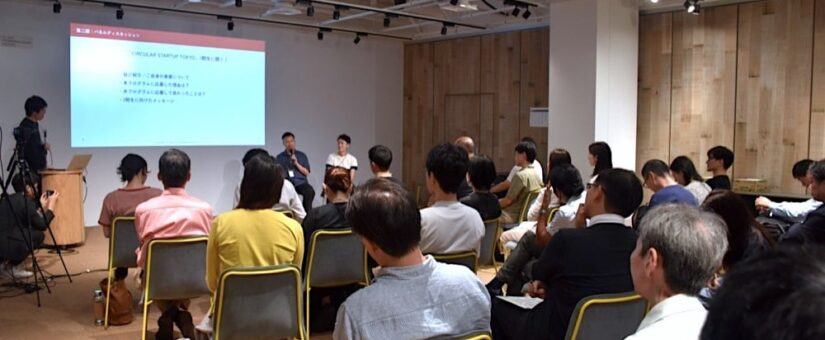
Event report: Circular economy-focused startup incubation program “CIRCULAR STARTUP TOKYO” information session held
- On Oct 22, 2024
- Business Startup Support Program, circular business, Circular Economy, CIRCULAR STARTUP TOKYO, event report, incubation program, SDGs, startup, sustainable use, Tokyo
On September 19, we held an information session for applicants interested in our startup incubation program, “CIRCULAR STARTUP TOKYO,” which focuses on the circular economy and is conducted in collaboration with the Tokyo Metropolitan Government.
Approximately 80 participants attended the event, both in person and online. Three guest speakers involved in circular startups and two first-term participants from CIRCULAR STARTUP TOKYO took the stage to discuss their initiatives, challenges for future development, and expectations for the program through presentations and a panel discussion.
This article reports on the guest talks from three different perspectives by Takano Iwasaki, Deputy Director of the Planning Division of the Resource Circulation Promotion Department at the Tokyo Metropolitan Environmental Bureau; Minoko Chiba, Specialist in Climate Change Countermeasures at the Climate Change Countermeasures Department of the Tokyo Metropolitan Environmental Bureau; and Hirokazu Kitahara, Partner at Archetype Ventures, along with a panel discussion featuring two first-term participants from CIRCULAR STARTUP TOKYO and Harch Inc. CEO Yu Kato, the organizer.

Description of the Information Session
Aiming to Create Circular Startups
In his opening remarks, Yu Kato, CEO of Harch Inc. and the program organizer, stated, “In the first term, we received applications from 50 wonderful teams and selected 16 teams from among them. Over the past four months, we have been able to improve various aspects of the program, and this second term has been further powered up. This time, we aim not only to create new cases from Tokyo but also to seriously address local issues in Tokyo.”

Harch Inc. CEO Yu Kato
Guest Talk from a Policy Perspective 1: “Japan’s Circular Economy Policies and Expectations for Startups: Towards Sustainable Use of Plastics”
Takano Iwasaki from the Tokyo Metropolitan Environmental Bureau’s Resource Circulation Promotion Department spoke candidly about the global trends surrounding plastics and the current challenges Tokyo faces regarding the sustainable use of plastics from an administrative perspective.
“We are currently facing three global environmental crises, and plastics symbolize these challenges. Plastics emit significant CO2 during production and incineration. Plastics that flow into the environment can harm biodiversity as animals ingest or become entangled in them, leading to environmental pollution.
Currently, discussions are underway at the United Nations to draft an international treaty to combat plastic pollution. In Japan, the circular economy has been positioned as a national strategy. Among these, plastics are a priority material. The Ministry of Economy, Trade and Industry plans to expand the obligation for manufacturers to use recycled materials, and the Ministry of the Environment is in the process of developing systems to enhance recycling.”
“The Tokyo Metropolitan Government is working towards zero emissions by 2050. We view the goal of zero net CO2 emissions by 2050 not as a target or goal but as a constraint. In a world of decarbonized plastic resource circulation, we cannot continue to produce plastics from fossil fuels or incinerate used plastics. Therefore, it is essential to achieve a ‘carbon-closed cycle’ in the production and consumption of plastics that does not emit CO2. What is needed is the technology for reuse and horizontal recycling that will dramatically reduce the amount of plastics used.”

Deputy Director, Resource Loss Countermeasure Section, Planning Division, Tokyo Metropolitan Government, Bureau of Environment, Takano Iwasaki
“Tokyo is a city of office buildings and commercial facilities, making solutions for the plastics used in these spaces extremely important. We are starting to see services that provide drinks and bento boxes in reusable containers in office spaces and restaurants. However, compared to the current system based on cheap and convenient disposable plastics from a linear economy, reuse services require more effort and incur costs for transportation and cleaning. Currently, most office plastics are incinerated as thermal recovery, but we need to switch to material recycling. While it is technically possible, the lack of established recycling routes and the increased processing costs are challenges.”
“There are many challenges in promoting the social implementation and expansion of reuse and horizontal recycling. Even though we know that introducing reuse in offices and switching from thermal recovery to material recycling for waste plastics are ‘good and desirable,’ it is very difficult to proceed without obligations or incentives. There is also a lack of data necessary for policy decision-making and administrative evaluation. Additionally, our communication about the necessity and importance of these efforts is insufficient. We need to broadly disseminate information to Tokyo residents and businesses within the city to increase awareness and utilization rates.
To accomplish these goals, the power of the government alone is not enough. We have worked with many, including startups, and we hope to continue collaborating with startups to solve the challenges Tokyo faces.”
Guest Talk from a Policy Perspective 2: “Japan’s Circular Economy Policies and Expectations for Startups: Administrative Challenges in the Energy Sector and the Intersection with the Circular Economy”
Minoko Chiba from the Tokyo Metropolitan Environmental Bureau spoke about administrative challenges in the energy sector and the expectations for the intersection between the energy sector and the circular economy.
“When considering climate change, we cannot avoid the issue of energy. It is said that CO2 emitted from cities accounts for about 70% of global CO2 emissions. Against this backdrop, the Tokyo Metropolitan Government has set the goal of ‘reducing greenhouse gas emissions in Tokyo by half compared to 2000 levels by 2030.’ This summer, we experienced very high temperatures, showing that climate change is becoming more immediate for us, and Tokyo bears the responsibility as one of the world’s major cities that consumes vast amounts of resources and energy. Furthermore, the current system, which depends on fossil fuels, is extremely vulnerable from the perspective of energy security, so we believe that advancing decarbonization efforts also contributes to ensuring energy security.”

Chief Climate Change Officer, Climate Change Policy Division, Tokyo Metropolitan Government, Bureau of Environment, Minoko Chiba
“The two pillars set by the Tokyo Metropolitan Government are maximizing ‘energy conservation,’ often referred to as the ‘first fuel,’ and expanding the use of ‘renewable energy.’ Half of the energy consumed in Tokyo is electricity, but when converted into CO2 emissions, the high CO2 emission factor of electricity accounts for about 70% of total emissions. Strengthening all initiatives toward decarbonization is necessary, but we particularly need to focus on the efficient use of electricity and the transition to renewable energy. We expect to see intersections between these policies and circular economy initiatives.”
“Regarding energy consumption, the only area where consumption has increased compared to 2000 is the ‘household sector,’ which refers to the energy consumed in our homes. This is also influenced by the increase in the number of households in Tokyo, so we need to promote more efficient energy use per household. For this, it is essential to improve insulation in homes and enhance the efficiency of air conditioners and water heaters.”
“While the government has continuously provided support measures, such as subsidies, we need to significantly increase the number of people willing to participate in these initiatives. In particular, we want to deepen our efforts to encourage those who are willing but have not yet taken action. New services and technologies, such as the reuse of high-efficiency air conditioners and the development of simple insulation materials, as well as the development of mechanisms for social implementation of these in the context of circular economy, would be greatly appreciated.”
Investor Guest Talk: “The Frontline of Circular Startups and What is Needed for the Success of Circular Business”
Hirokazu Kitahara from Archetype Ventures spoke on the theme, “Is Circular Economy an Issue Startups Should Tackle Now?” providing insights from the perspective of venture capital regarding the global social situation surrounding circular startups and the conditions necessary for their success.
“For startups aiming for significant growth in a short period of about ten years, it is essential for the ‘technology,’ ‘society,’ and ‘customer’ aspects to align.”
“From these three perspectives, we see that nearly 4,000 circular economy startups have already emerged globally. Various technologies, such as digital product passports that summarize information on resource circulation, are being developed and disseminated.”
“Additionally, society is changing. The circular economy and resource circulation are increasingly being understood as part of a broader structural concept that facilitates the smooth flow of various materials. Progress has been made over the past six months in standardizing and organizing the elements needed to compile information in digital product passports.”
“When it comes to consumers, I honestly feel that circular economy concepts have not yet been widely recognized enough in Japan for practical implementation. However, for startups, this timing can also be seen as an opportunity.”

Partner, Archetype Ventures, Hirokazu Kitahara
Looking at the flow of global startup funding, Kitahara noted that the circular economy sector is steadily growing alongside climate tech. He emphasized five key aspects necessary for the success of circular business:
1. Integrating Circular Economy with Broader Themes: It is important not to view the circular economy in isolation but to consider it in conjunction with related themes like net zero. Focusing solely on the circular economy can narrow the concept and lead to isolated optimization.
2. Collaboration with Existing Players: Successfully entering the circular economy sector requires collaboration with established players. The social implementation of circular initiatives can be challenging; therefore, startups must design their products and services with market delivery in mind.
3. Holistic System Perspective: In sustainability and circular economy fields, which involve system changes, it is crucial to consider the system as a whole. Unlike IT sectors, where individual components may work well, a narrow approach will not yield economic viability in these areas.
4. Multi-Product Strategy: Startups often begin with a single product due to limited resources. However, to change the entire system, it is necessary to develop multiple products from the start, despite the challenges this may entail.
5. Aiming for Scale: In my discussions with sustainability stakeholders, I often sense a strong desire to ‘do something good for society.’ While this is commendable, prioritizing economic viability is crucial for systemic change. Creating initiatives that build strong communities is important, but from a startup perspective, the goal should be to create businesses that can effect systemic change and be exported globally.
CIRCULAR STARTUP TOKYO Cross-Talk Session with First Cohort
In the following panel discussion, we invited Tomonobu Shigeta, CEO of PHI Co., Ltd., and Satoshi Kishi, CEO of Naocel Co., Ltd., who are part of the first cohort of CIRCULAR STARTUP TOKYO. Yu Kato, CEO of Harch Inc., moderated the discussion.
Q: What made you decide to apply for CIRCULAR STARTUP TOKYO?
Shigeta: “While conducting educational projects at my company, I had been considering how to leave a greater impact on society, and I was looking into introducing educational programs to public schools. I was feeling somewhat frustrated that being associated with a large company was making things more difficult. It was around that time that I encountered CIRCULAR STARTUP TOKYO, which inspired me to apply and choose the path of starting my own company.”
Kishi: “Before applying, I was already engaged in a smartphone collection business. When collecting broken smartphones from customers, I was receiving them via courier, but I wanted to start setting up collection spots. That’s when I learned about CIRCULAR STARTUP TOKYO, and I thought it would be the perfect opportunity for a pilot project, so I decided to apply immediately.”

CEO of PHI Inc., Tomonobu Shigeta
Q: How did you find the program after participating?
Shigeta: “The lectures were at a higher level than I had anticipated, and to be honest, I was just doing my best to keep up. Conversely, it means that I was able to hear such high-level discussions. I also learned a lot from the failure stories of those who are actually running businesses. The mentoring was very good as well. Whenever I expressed what I wanted to learn, they quickly connected me with mentors. Through introductions from mentors, I was even able to gain certification from J-Startup WEST Supporters.”
Kishi: “The program period flew by in no time, which I think reflects how fulfilling it was. In the lectures, I was able to hear various discussions that I could apply to my own business. Even just chatting casually with participants and mentors during the lectures led to unexpected encounters and breakthroughs. As for reflections, while we managed to conduct three pilot projects in one month, I sometimes feel we should have focused more deeply on one location. Nevertheless, I feel satisfied that we achieved our initial goals.”
Shigeta: “I wish we could have created new initiatives among participants. In fact, I’m currently working with someone from the first cohort to develop new apparel-related businesses and products to make up for that.”

CEO of Naosel Inc., Satoshi Kishi
Q: Finally, do you have a message for the second cohort?
Shigeta: “I hesitated to apply at first, but now I truly feel it was a great decision. During the program, I communicated with nearly 100 people, and many unexpected things happened, allowing me to see a different world. If you’re unsure about applying, I recommend you give it a try.”
Kishi: “I think CIRCULAR STARTUP TOKYO is a very appealing program. Above all, both the secretariat and the mentors are extremely supportive. I hope everyone participates and builds many good connections.”
Moderator Yu Kato concluded the discussion by saying, “I believe those who actively reached out to mentors and the secretariat broke through barriers and achieved results in a short period. Approaching this with the spirit of utilizing mentors and the community behind them would be very beneficial.”

Description of the Networking Event

For more information about the CIRCULAR STARTUP TOKYO program, click here.
[Related Page] CIRCULAR STARTUP TOKYO begins accepting applications for second-term participants and partners!
[Related Site] Circular Economy Hub (in Japanese)







